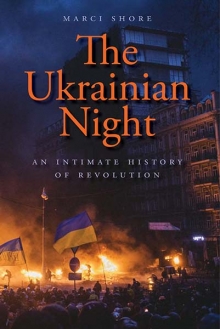 Marci Shore’s strikingly innovative The Ukrainian Night was prompted by her sense of how little Ukraine’s 2014 revolution was understood, notes Peter Pomerantsev, a director of the Arena Program at the London School of Economics.
Marci Shore’s strikingly innovative The Ukrainian Night was prompted by her sense of how little Ukraine’s 2014 revolution was understood, notes Peter Pomerantsev, a director of the Arena Program at the London School of Economics.
Shore identifies “a scale of revolutionary behavior through which the individual is transformed, and which opens the way for society to have purpose again,” he writes for the American Interest:
- The first stage is “spontaneous self-organization,” where previously alienated, passive groups are brought together to create improvised street kitchens, hospitals and self-defense units in a “laboratory of social contract”: “a union of IT specialists from Dnipropetrovsk and a Hutsul shepherd, an Odessa mathematician and a Kiev businessman, a translator from Lviv and a Tatar peasant from Crimea.” The far-Right is present too, but if the revolution is to be truly democratic, wouldn’t it have to contain all parts of society, even the most sickening?
- Stage two involves taking a radical, often life-threatening choice: in a space of no ideology, the readiness to embrace personal risk confers meaning. The rock singer Slava Vakarchuk (seen by some as a future President) believes that the first deaths among the revolutionaries instigated “the main tectonic shift. . . towards something more responsible and less paternalistic.”
- Next comes a strange sense where “time is smashed,” where those involved in the revolution seemed to enter a space where the normal clock was suspended, and which created a condition in which the next, critical, phase could be born: the emergence of values…
- After “values” comes what Shore refers to as the “non-analytical point,” where all rational calculation breaks down, and where a mass of people are prepared to die for a cause, and after which, if they survive, some sort of “revolutionary soul” emerges, defined by the revolutionaries’ readiness to sacrifice themselves for each other. …
The Ukrainian Night raises a series of nagging questions, Pomerantsev adds: What does it mean to be a nation in a time of globalization? How can one embrace both the multi-ethnic, multi-lingual reality and a coherent polity? How does one generate a discussion of progress in an age of ultra-relativism, where everyone has their own version of the truth?







